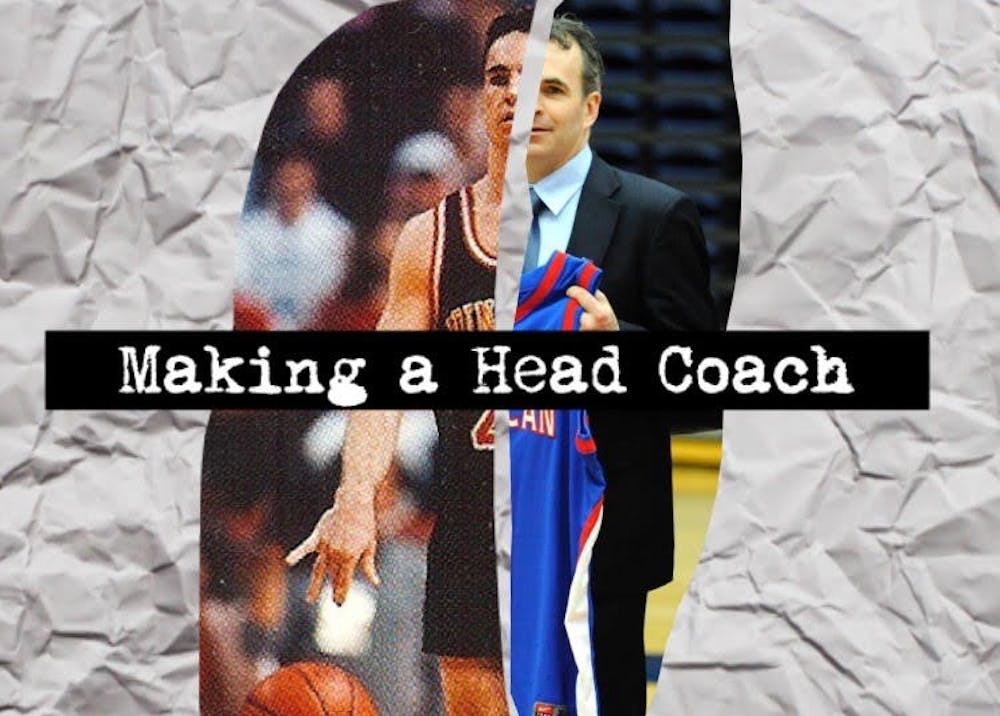Every afternoon in Bender Arena, Mike Brennan’s sharp, hard voice cuts through the air, demanding perfect execution and flawless technique from his athletes in his heavy New Jersey accent. He paces back and forth across the gym floor, frantically following the plays and actions of his athletes.
Playing under legendary basketball hall-of-famer Pete Carril at Princeton, Brennan learned the art of the “Princeton Offense” and the meaning of hard work. Carril ran a program full of committed athletes, but Brennan, a four-year point guard at Princeton, exceeded Carril’s demands with unrelenting hard work, and he has carried this mindset into his coaching style at AU.
“He [Brennan] was very smart, he was good defensively. He played very smart, cerebral would be the word for it,” Carril said regarding Brennan’s play at Princeton. “He saw things before they happened, and he was dedicated, he wanted to be good.”
Brennan’s determination to improve began every day in practice, according to teammates and coaches. Chris Mooney and Rick Hielscher, who played with Brennan at Princeton, described their teammate as the “first to practice and last to leave.” Carril also praised Brennan for his continuous commitment to improving his basketball fundamentals, shooting, passing and dribbling. Carril said his athlete frequently took more than 300 shots before practice.
Brennan’s methodical and diligent manner earned him a co-captain title, along with Mooney, his junior and senior year. Brennan and Mooney welcomed the responsibilities associated with the leadership position, including hosting recruits on visits, because of their “investment in the program,” according to Mooney. On the court, both largely lead by example.
“Coach Pete Carril was a very singular presence at Princeton. He was in charge,” Mooney said. “It wasn’t the type of place where you were going to interrupt a coach or give a preachy speech or anything like that. It was about being a good player and working hard every single day.”
Princeton then-assistant coach Bill Carmody said Carril’s environment allowed Brennan, often described as “quiet” by his teammates and coaches, to succeed.
“I don’t think he ever became verbal, like ‘rah-rah, c’mon guys’,” Carmody said. “But he was an unquestionable leader, and Mooney too, they were very committed to basketball and winning, and they gave it their all.”
After graduation, Brennan served as a volunteer assistant coach at Columbia University for a year, then played international basketball for four years. In 2000, Brennan returned to his alma mater as a full time assistant coach under then Princeton’s then-head coach Bill Carmody. The reunion was short lived, however, as Carmody accepted a position at Northwestern University three days later. Brennan stayed at Princeton after Carmody’s departure and worked under new head coach John Thompson III, a previous Princeton assistant coach as well.
Brennan developed as an assistant coach at Princeton from 2000-2007 under John Thompson III and then Joe Scott, and his passion for hard work and player development continued to grow.
“Certain guys see the game, think the game, feel the game,” Scott said. “The game is in their blood, it’s who they are, and he’s obviously one of them.”
In 2007 Brennan made the move to AU, a new challenge for him because AU’s head coach at the time, Jeff Jones, did not run the “Princeton offense,” a style which Brennan adopted as both a player and a coach. Jones, however, immediately utilized Brennan’s capabilities to develop players, and he noticed players seeking out personal coaching from the Princeton alum during practice.
“The thing I think Mike gravitated towards, he was very very good at it but he also was very passionate about, player development,” Jones said. ”That’s where he probably made the biggest difference”.
Even with Brennan’s years of experience and his ability to enhance his players capabilities, Jones still expressed hesitation that Brennan would ultimately take on the head coach role. He said he knew the coach could handle the duties of the position, but Jones expressed that being a head coach involved more than the on-court responsibilities.
“The one thing is Mike loves being on the court, and as a head coach there is so many other hats that you have to wear,” Jones said. “And I think when he was still [an assistant] at American he still needed to learn the other hats and to appreciate that that’s just part of the job.”
Jones cited off the court responsibilities placed on a head coach like recruiting, speaking with the media, as well as meeting with alums and boosters, as reasons for his hesitation about Brennan being a head coach. Jones timid response to Brennan’s head coaching future stemmed from their daily interactions or lack thereof.
“Mike is, off the court, and I’m stressing [the words] off the court, he is very quiet,” Jones said. “I would say maybe even shy, off the floor.” Jones said he would repeatedly encourage Brennan to talk during coaching meetings and games. At the time, Jones said “it wasn’t always easy getting him [Brennan] to speak up.”
However, Jones asserts Brennan’s off-the-court soft-spoken nature shouldn’t be confused with a passive attitude or a lack of emotion.
“If you gave me a hundred adjectives to describe Mike Brennan, laidback would not be included in those one hundred adjectives. He is as intense of a competitor, as a coach, that I have ever been around,” Jones said. “There is a very, very hot fire inside of him in terms of his desire to play a certain way and to win.”
Carril, who has held a longtime bond with Brennan, attended countless Brennan-coached games and wholeheartedly believed in his former student’s ability to become a coach.
“If there is such a thing as a born coach, he comes close to it,” Carril said.
Carril often compares himself to Brennan when discussing coaching philosophies and ideas about the sport of basketball. The Princeton coaches share a similar level of intensity, perfectionist attitudes, leadership and personality, both on and off the court.
“I have the same thing he does,” Carril said. “You think about things and the way you think about them affects what you see and what you see affects what you do.”
In 2009, Brennan reunited with Thompson at Georgetown University before finally receiving his first head coaching position in 2013 at AU.
Once back at AU, Brennan thrived, winning a Patriot League championship in his first year and reaching back-to-back Patriot League championship finals. In his third year as head coach, the Eagles have struggled, having one of the worst records in team history. But with a core of freshman starters, Brennan aims to develop each player’s skillset as he has with former Eagles.
Players and former coaches no longer describe Brennan as quiet, at least on the court, and he has become known for yelling to convey his messages.
“As a coach, he is very demanding. He is a perfectionist because he is a brilliant teacher. Extremely demanding and extremely competitive,” former assistant coach Nate Philippe said.
Often heard screaming from the bench or loudly voicing his frustration with his team during games, Brennan’s volume and tone may be interpreted as constant anger, but Philippe said the head coach is just building off his experiences and trying to create a program like the ones he came from.
“His vision for the program at American is very similar to what he has done at Princeton and at Georgetown,” Philippe said. “Us coaches are very influenced by the coaches that you have worked with and played for. He told me that the program he wanted to build at American was one similiar to the programs he has worked around and played for throughout his career.”





